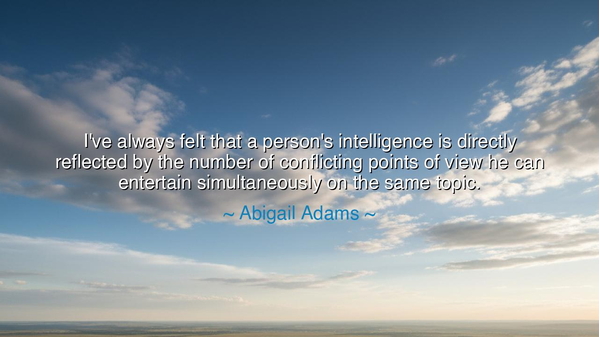
I've always felt that a person's intelligence is directly
I've always felt that a person's intelligence is directly reflected by the number of conflicting points of view he can entertain simultaneously on the same topic.






“I've always felt that a person's intelligence is directly reflected by the number of conflicting points of view he can entertain simultaneously on the same topic.” Thus spoke Abigail Adams, one of the sharpest minds and most courageous spirits of America’s founding age. In this profound reflection, she unveils a truth both rare and eternal — that true intelligence is not the rigidity of belief, but the flexibility of thought. To hold many perspectives in the mind without fear or anger, to see the world not as simple or singular but as layered and complex — this is the mark of a truly wise soul. For the shallow mind clings to certainty; the deep mind embraces contradiction and seeks harmony within it.
The origin of these words lies in the heart of a woman who lived amid revolution — a time of turmoil, transformation, and moral paradox. As the wife of John Adams, second president of the United States, and the mother of John Quincy Adams, the sixth, Abigail’s life was woven into the very fabric of her nation’s birth. Yet she was more than a witness to history; she was its conscience. In letters that still burn with clarity and wit, she debated politics, morality, and equality with her husband and peers. Surrounded by men of intellect and ambition, she saw firsthand how conviction can blind as easily as it can guide. Thus, her insight was born: that intelligence must not only think, but understand opposing truths, for only then can wisdom arise from passion.
To entertain conflicting points of view is no small task. It demands humility — the strength to admit that one’s vision is incomplete. It requires courage — the willingness to face discomfort and doubt. And it calls for empathy — the ability to feel the truth in another’s heart, even when it contradicts your own. The wise person, as Abigail teaches, does not seek victory in argument but balance in understanding. To know that light and shadow coexist, that justice and mercy may pull in opposite directions, that love can be both pain and joy — this is to grasp the deeper rhythm of life itself.
History offers many who embodied this wisdom. Consider Abraham Lincoln, who, in the midst of civil war, bore within himself the full weight of opposing truths. He fought for union, yet felt the sorrow of the divided. He believed in justice, yet saw the cost of vengeance. He wrote, “We are not enemies, but friends. We must not be enemies,” because he could see both sides of the nation’s torment. His greatness did not lie in certainty, but in his capacity to hold contradiction without surrendering to despair. Like Abigail, Lincoln knew that intelligence is not rigidity, but the ability to comprehend the whole of human conflict.
Abigail Adams’s wisdom also reveals the moral foundation of democracy itself. A society that cannot hold differing ideas in dialogue descends into tyranny or chaos. The ability to entertain opposing perspectives — to listen before judging, to reason before condemning — is not only the measure of intelligence, but of civilization. She saw that the Republic her husband helped build would survive not through force, but through the maturity of thought among its citizens. Thus, her words echo across the centuries as a call to all free people: to think widely, to question bravely, and to hold compassion for those whose truths differ from our own.
And yet, this wisdom is as personal as it is political. In our daily lives, we are faced with conflicts — between duty and desire, reason and feeling, self and others. The person who can hold these tensions without breaking, who can see both the storm and the calm, who can listen to others without losing themselves — such a person grows not only in intellect but in spirit. To live well, one must learn to contain contradiction and find meaning within it. For the heart, like the mind, expands only through what it is willing to endure.
Let this, then, be the lesson passed down through the ages: Do not fear contradiction, but learn from it. When you encounter ideas that challenge your own, do not rush to reject them — listen. Let them sharpen your understanding, not your anger. Read widely, question deeply, and welcome the discomfort of doubt, for it is the soil from which wisdom grows. True intelligence is not the voice that shouts the loudest, but the one that can hear the music in every voice.
In the end, as Abigail Adams teaches, the wise person is not one who has all the answers, but one who can hold many questions in peace. Intelligence is not the triumph of certainty, but the harmony of complexity. To think greatly is to love truth in all its forms, even when it speaks in many tongues. For the soul that can hold many views at once without losing balance has achieved not only intelligence — it has touched the edge of enlightenment itself.






AAdministratorAdministrator
Welcome, honored guests. Please leave a comment, we will respond soon